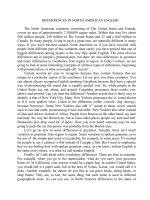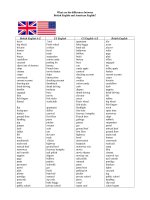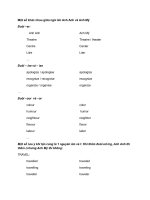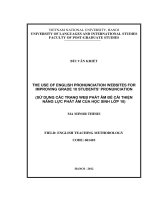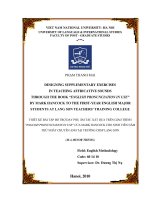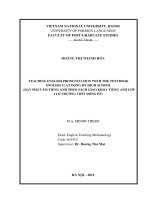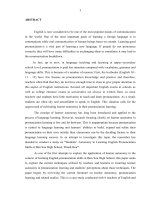American - English Pronunciation
Bạn đang xem bản rút gọn của tài liệu. Xem và tải ngay bản đầy đủ của tài liệu tại đây (524.35 KB, 88 trang )
July 6, 2013
American English Pronunciation Program
Living Language
Written by Barbara Raifsnider
1999
Первые четыре кассеты я пропускаю – они есть в брошюре.
А вот две последние пытаюсь на слух законспектировать.
Потом выделю главное.
Работа идет не равномерно – по обстоятельствам. ;-)
Замечания по почте или Icq#75088656// slavaaa @ hotmail . com или надежнее
yanko _ slava @ yahoo . com
1. Первое на что бы я хотел обратить внимание – это “ T ” и “ D ” между гласными, не важно
“TT” или “DD” это. Звучат они почти одинаково — T
d
. Можно сказать, что чистой буквы
“T” в американском языке гораздо меньше чем нам кажется. Второе, касающееся буквы
“T” — ее любят не произносить вааще (Смотрите Drop “T” and “D”) в окончании слов
или имитировать ее прерыванием потока воздуха, как в слове «Wha(t)» — т.е. “T” не
произносят, но при этом как бы резко обрывают голос. С буквой “D” та же история. Ее
вааще не произносят, например, в слове Friends и ему подобных. Но нужно понять, что
эти несколько фишек используются ТОТАЛЬНО. И это меняет все звучание беглой речи
начисто. Для примера можете послушать припев из песни той же Агулеры “Genie in a
Bottle” — где Bottle звучит как Bott
d
le. Это правило.
2. Второе — это буква “i” совсем не русская «и» - чаще это «Ы» или вааще, так называемая
«ШВА» некое «Э». Например, на курсах English здесь, в New York’e мне не могли
объяснить разницу между Сукой и Пляжем. Говорили — освоитесь – научитесь
различать. Да все проще — Beach – более русское «И», а в Bitch – откровенно и грубо
Бы[э]ч. Вот и все. Это различие между «И» и «Ы» принципиально.
3. При образовании множественного числа буквой “S”, для меня разница психологически
заключалась в том, что я это окончание больше ощущал как относящееся к слову, в
котором оно и образует множественное число. Но на практике, в устной речи, это
окончание всеееегггдддаааа сливается с последующим словом больше чем с тем, в
котором оно образует множественное число. И так получается, что просто следующее
слово начинается с буквы “S”.
4. Четвертое — это drop the “H” и “TH”. Это вааще мне показалось сенсацией на практике.
Что такое ДыдыДуЫт? = Did He Do It? При этом, как говорилось в первом пункте — “D”
между гласными звучит и произносится как D
d
. Получается скороговорка Did
d
H e D
d
o It
как одно слово. Тоже самое и с “TH”.
5. Дальше слияние или вычеркивание одинаковых букв в окончаниях предыдущих и
началах последующих слов. I hat e t o do it.
6. Шестое — опять-таки Drop “T” в DON’T CAN’T и прочих. Например, в Хвостатых
вопросах — isn’t it и прочая.
American English Pronunciation Program.........................................................................1
Cassette 1.1-2.2..................................................................................................................................5
Cassette 1.1.............................................................................................................................10
SECTION ONE: VOWELS....................................................................................................................10
Здесь закончил....................................................................................................................14
SHORT VOWELS...............................................................................................................................14
CONFUSING VOWEL PAIRS LONG EE / SHORT IH...........................................................19
LONG A/SHORT EH.............................19
LONG O / SHORT O.............................19
SECTION TWO: CONSONANTS.........................................................................................................24
SIMPLE CONSONANTS...................................................................................................................24
R.......................................................................................................................................................25
COMPARISON L / R............................26
TH: VOICED / VOICELESS PAIRS..............................................................................................26
S..............................................................27
Z..............................................................28
COMPARISON: S / Z............................28
SH....................................................................................................................................................29
ZH....................................................................................................................................................29
COMPARISON: ZH / SH.......................29
F.......................................................................................................................................................30
V......................................................................................................................................................30
COMPARISON F/V...............................31
M......................................................................................................................................................31
N......................................................................................................................................................31
NG....................................................................................................................................................32
NG + G............................................................................................................................................32
NK....................................................................................................................................................33
Y......................................................................................................................................................33
W......................................................................................................................................................34
H......................................................................................................................................................34
P.......................................................................................................................................................35
PH....................................................................................................................................................35
PS.....................................................................................................................................................35
B.......................................................................................................................................................35
T.......................................................................................................................................................36
D......................................................................................................................................................36
COMPARISON T/D...............................37
K......................................................................................................................................................37
G......................................................................................................................................................37
J........................................................................................................................................................38
CH....................................................................................................................................................38
COMPARISON SH / CH........................39
hints 1 ......................................................................................................................................................39
1 STRESSED SYLLABLES BEGINNING WITH P, K.T.................................................................39
P.......................................................................................................................................................39
K......................................................................................................................................................39
T.......................................................................................................................................................39
2 UNSTRESSED SYLLABLES BEGINNING WITH P, K.T...........................................................39
3 MIDDLE Td.........................................................................................................................................40
COMPARISON: MIDDLE T/MIDDLE D41
4 T / D FOLLOWED BY L AT THE END OF WORDS...................................................................41
5 T FOLLOWING N...........................................................................................................................41
6 T FOLLOWED BY -EN,-ON,-IN....................................................................................................42
7 T, D. K, G, P. or B AT THE END OF A WORD.........................................................................42
GRAMMATICAL ENDING S as /S/..................................................................................................43
GRAMMATICAL ENDING –ED......................................................................................................44
INITIAL CONSONANT CLUSTERS....................................................................................................46
FINAL CONSONANT CLUSTERS.......................................................................................................56
Cassette 4.1.............................................................................................................................63
Hints .......................................................................................................................................63
Hint # 1 ...................................................................................................................................................63
Stressed syllables beginning with P, K, T...........................................................................................63
Hint # 2 ...................................................................................................................................................63
Unstress syllables beginning with P,K,D............................................................................................63
Hint # 3 ...................................................................................................................................................63
MIDDLE “T”. “…t…; …tt…” = “Td”...............................................................................................63
MIDDLE “D”. “…d…; …dd…” = “Td”............................................................................................63
Hint # 4 ...................................................................................................................................................63
T / D followed by “L” at the end of the words....................................................................................63
Hint # 5 ...................................................................................................................................................64
“T” following “N”...............................................................................................................................64
Hint # 6 ...................................................................................................................................................64
“T” folowed by —EN, —ON, —IN. .................................................................................................64
Cassette 5.1.............................................................................................................................64
Final clusters sounds................................................................................................................................64
Section III: Linking..................................................................................................................................64
1. Link a final consonant sound to a vowel to begin the next word................................................64
2. Появление Y-sound between two words....................................................................................64
4. Одинаковые или похожие окончания и начала следующих слов.........................................65
5. Consonant + Vowel = LINKING ...............................................................................................65
6. Y-link...........................................................................................................................................65
Cassette 5.2.............................................................................................................................65
Practice exercises using the W— link.................................................................................................66
Practice Y— link.................................................................................................................................66
Конец — Начало. The end + the beginning.......................................................................................66
Drop “T” and “D”.................................................................................................................67
SECTION 4 Reduced English.............................................................................................67
PART I Reductions..................................................................................................................................68
The second category of vowel reductions ..........................................................................................69
IS and AS sound the same...............................................................................................................69
“AS”.................................................................................................................................................69
“IS”..................................................................................................................................................69
“WAS”.............................................................................................................................................69
“IN”.........................................................69
“OF”.................................................................................................................................................69
OF = [A]..................................................69
“OF” = [OV]...........................................69
“AND” and “AN” sounds the same = “N”......................................................................................69
“AND”.............................................................................................................................................70
“AN”................................................................................................................................................70
“AT”................................................................................................................................................70
“FOR”..............................................................................................................................................70
“OR” and “ARE” sounds the same..................................................................................................70
“ARE”..............................................................................................................................................70
“OUR”.............................................................................................................................................70
“THE” [tha], [thi:]...........................................................................................................................70
“THAN”...........................................................................................................................................71
“YOUR”..........................................................................................................................................71
“SOME”...........................................................................................................................................71
“BUT”..............................................................................................................................................71
“TO”................................................................................................................................................71
Some “WH—words” are reduced when they being used as conjunction. ..........................................71
PART 2 CONTRACTIONS. ..................................................................................................................72
‘m, ‘is, are, have, has.......................................................................................................................72
Cassette 6.1.............................................................................................................................73
ISN’T .....................................................73
AREN’T .................................................73
DON’T....................................................73
DOESN’T...............................................73
DIDN’T...................................................73
HASN’T..................................................73
HAVEN’T...............................................73
HADN’T.................................................73
CAN&CAN’T..................................................................................................................................73
“H”— reduction.......................................................................................................................................74
HAVE.....................................................74
HAVAN’T..............................................74
HAS/HE..................................................74
HIS..........................................................74
HASN’T HE...........................................74
HAS HIM................................................74
HERS......................................................74
HASN’T&HER.......................................74
HE’S........................................................74
Rapid English Hints and Phrases........................................................................................74
S, Z,T,D before “Y” ...........................................................................................................................74
S+Y=[SH] [Ш].......................................74
Z+Н=[ZH] [ЖЬ] [ЖЬЁ].........................75
T+Y=[CH] [ЧЬ]......................................75
D+Y=[DJ] [ДЖЬЮ]...............................75
S/Z+SH=[SH][Шь].................................75
THE REDUCTION MANY COMMONLY USED VERB FORMS .................................................75
Has to......................................................75
Have to....................................................75
Had to......................................................75
Ought to..................................................75
Got to......................................................76
Want to....................................................76
Used to....................................................76
Suppose to...............................................76
MODAL CONTRACTIONS. .............................................................................................................76
Таблица modal contractions ..........................................................................................................76
Should have.............................................76
Shouldn’t have........................................76
Would have.............................................76
Wouldn’t have.........................................76
Could have..............................................76
Couldn’t have..........................................76
Must have................................................76
Must not have..........................................76
Might have .............................................76
Use easier form before consonants. ................................................................................................76
“DON’T” = “DONE” [doun]..................76
“DIDN’T” = [DINT] or [din(t)]..............77
RAPID ENGLISH PHRASES.................................................................................................................77
What do you = [wodiya] [вудийа]..................................................................................................77
Who does = Who’s [huz] [ху:з]......................................................................................................77
Where did I = Wheredy [уэадай]....................................................................................................77
Where did you =Wheredja [уэаджа]...............................................................................................77
What am I = Whatdamy [уотdэмай]...............................................................................................77
What are you = Whatcha = [уотча].................................................................................................77
… am I = my [май]..........................................................................................................................77
Are you = areye [арйе]....................................................................................................................77
Could you = Couldja [куджа].........................................................................................................77
Couldn’t you = Couldnchu [куднчу]..............................................................................................77
Would you = wouldja [вуджа]........................................................................................................77
In informal conversations to drop the helping or auxiliary verbs out of questions.............................78
SECTION 5 STRESS............................................................................................................78
—hood, —ship, —ful(l), —wise, —ness, —some, —less, —an, —er, —ish, —ly, —able, —al, —dom, —ess, and —en
Stress NounsVerbs...........................................................................................................................79
Stress of Phrasal Nouns Phrasal Verbs............................................................................................80
Phrasal verbs — stress on 2nd syllable...80
Noun – stress on 1st syllable...................80
—ate........................................................80
—ATE Verbs = [ei]................................80
Adjectives, nouns = [эт].........................80
—ble........................................................81
—ic..........................................................81
—ion.......................................................81
––ial.........................................................81
—ical.......................................................81
—ity........................................................81
—ous.......................................................81
—graph...................................................81
—graphy.................................................81
—ian........................................................81
—ient.......................................................81
—logy.....................................................81
—ify........................................................81
—ain........................................................81
Конец 6.1.........................................................................................................................................81
Cassette 6.2.............................................................................................................................81
— ICE.....................................................81
— ILE.....................................................81
— INE.....................................................81
UNSTRESS PREFIXES .........................................................................................................................82
a— , be— , for— , out— , over— , un— , under— , up— , with— ..........................................82
THE ENDS..............................................................................................................................................82
— ness, —ment, — able, — ive, — ous, —or, —ist..................................................................82
The endings came from French – Stress of/or the last syllable...................................................82
LINK THE VOWEL................................................................................................................................82
VOWELS.............................................................................................................................................82
T—D....................................................................................................................................................83
P—B....................................................................................................................................................83
K—G....................................................................................................................................................83
F—V....................................................................................................................................................83
S—Z.....................................................................................................................................................83
TH[S]—TH[Z] after TH[Z] + “E” = [Z].............................................................................................83
SECTION VI.........................................................................................................................84
PART I ...................................................................................................................................84
INTONATION........................................................................................................................................84
1. Обычное предложение..............................................................................................................84
2. Exclamatory statement. ...............................................................................................................84
3. Command.....................................................................................................................................84
4. Choice-questions..........................................................................................................................84
TAG-QUESTIONS..............................................................................................................................85
LISTENING........................................................................................................................................85
PART II..................................................................................................................................86
WORD STRESS......................................................................................................................................86
KEY-WORDS.....................................................................................................................................86
THIRD GROUPS................................................................................................................................86
Next we’ll talk about PREPOSITIONS...............................................................................................87
Finally here some examples of stressed pronouns...............................................................................87
PART III.................................................................................................................................87
SPEECH PATTdERNS...........................................................................................................................87
VOICE RANGE......................................................................................................................................87
END........................................................................................................................................88
Cassette 1.1-2.2
Я бы обратил внимание на звук — L (21)
Варианты O = A (стр. 18) Cassette 3.2
T
d
&D — стр.41 Cassette 3.2
LIVING LANGUAGE
®
A Random House Company
American English Pronunciation Program
Written by Barbara
Raifsnider
Edited by Christopher
A.Wamasch
Copyright® 1999 by Living Language,A Random
House Company.
All rights reserved. No part of this book may be
reproduced in any form or by any means, electronic or
mechanical, including photocopying, recording, or by any
information storage and retrieval system, without
permission in writing from the publisher.
Published by Living Language.A Random House
Company, 201
East 50th Street, New York, New York 10022.
Random House, Inc. New York, Toronto, London,
Sydney,
Auckland.
Living Language' is a registered trademark of
Crown Publishers, lnc.,A Random House
Company.
www.livinglanguage.com
Manufactured in the United States of America.
ISBN 0-609-60419-8
1098765432 I
First Edition
Living Language* publications are available at special
discounts for bulk purchases for sales promotions or
premiums, as well as for fund-raising or educational use.
Special editions can be created in large quantities for
special needs. For more information, write to: Special
Sales Manager, Living Language, 201 East 50th Street,
New York. New York 10022.
ACKNOWLEDGMENTS
Thanks to the Living Language staff: LisaAlpert, Ana
Suffredini, Andrea Rosen, Christopher Medellin,
Germaine Ma, Eric Sommer, Helen Tang, Erin Bekowies,
Amy Boorstein, and Jim Walsh.
Recorded at Paul Ruben Productions, Inc., New York.
NY. Special thanks to Paul Ruben, Paula Parker, Jeff
Woodman, and Zed Starkovich.
CONTENTS
SECTION ONE: VOWELS
Long Vowels 11
Short Vowels 15
Vowels Followed by L or R 21
SECTION TWO: CONSONANTS
Simple Consonants 25
Initial Consonant Clusters 47
Final Consonant Clusters 57
Please note that the following sections appear on the
recordings only:
SECTION THREE: LINKING SECTION FOUR:
REDUCED ENGLISH SECTION FIVE: STRESS
SECTION SIX: INTONATION
LIVING LANGUAGE
A Random House Company
American English Pronunciation Program
Cassette 1.1
SECTION ONE: VOWELS
To pronounce long vowels:
1. Keep your tongue tight.
2. Hold the sound of the vowel.
3. Make your voice go up and then glide down at the end.
To pronounce short vowels:
1. Keep your tongue relaxed.
2. Keep the sound short.
3. Do not let your voice glide down at the end.
beat/bet cape/cap hope/hop
LONG VOWELS
LONG EE Common Spellings: e, ee, ea, e + consonant +
e, -y
he three be we she tree
knee gee see Lee Dee fee
key pea tea agree keep heat
seat seek leap meek weak bead,
read deep sweep repeat deplete concede
sweet
Here, take this seat. I think we all agree that the tree needs
to be trimmed.
When does he go out to sea?
How can you leap to such sweeping conclusions?
This heat is depleting my energy.
11
LONG I Common Spellings: i, ie, y, igh, i +
consonant + e
hi bye tie die my sigh
try lie eye rye guy why
type write like pipe white wipe
Mike excite ignite light wide survive
knife time wine fine line bind
nine align I'm mime blind lime
pine dine rhyme
What time do you dine?
Try to write like this.
I'm fine right now.
Where did you buy that beautiful tie?
That was quite an exciting ride!
LONG A Common Spellings: a, ay, eigh, ai, a + consonant
+ e, ea
day hay weigh Ray may Kay
gay lay date hate wait rate
mate Kate gate late dame haste
waste raid made cape game lane
radio taper major
This is my roommate. Ray. Jake and Kate bought
d
a great
cake. I hate to wait for the news. Let's not delay the game
by changing the date. Don't you just hate to pay your
taxes?
12
OY Common Spellings: oy, oi, eu
boy coy toy Roy soy joy
enjoy employ cloy doily annoy poi
rejoice voice Boyd Lloyd avoid
voyage Freud loit
d
er join joint ointment
coin choice oyster poison cloister void
moist loyal royal flamboyant
Try some ointment on your joints.
That boy has too many toys.
I heard Freud's voice in my dream.
We made our choice by flipping a coin.
Please void this check.
LONG OO
Common Spellings: oo, u, ough, ue, ew, u + consonant
+e
blue too through who woo sue
drew zoo glue review you construe
pursue debut Magoo few shoe boo
tube feud exude moon June soon
typhoo
n
balloon resume exhume buffoon cartoon
rude deduce new duke conclude
Luke kook excuse amuse tune
The following words have a Y sound before OO:
few pew ewe excuse perfume
huge refuge cute beauty
13
Don't be too rude to Drew. What can you deduce from the
review of your play? A few of us want to walk through
the zoo. June uses too much perfume. How much fruit
does that animal consume?
LONG O Common Spellings: o, ow, oe, ough, o +
consonant + e
hoe row bow low so go
Joe know toe blow foe mow
oh Poe stow woe dough slow
pope rope goad load road wrote
vote note slope don't elope joke
soak roam cone phone tone grown
Edgar Allan Poe wrote many short stories. Do you know
where the note was stowed? Leave a message after the
tone an d I'll phone you back. You aimed your bow a little
too low. What kind of jokes do you know?
OW [AU] Common Spellings:
ow, ou [ау]
ow how wow sow cow bow
now chow pow row vow loud
route about shout doubt rowdy dowdy
slouch crouch couch powder flowers shower
town clown round gown brown down
mound drown found wound noun pound
sound
14
How many pounds of ground round do you want? If you
take this route, you'll arrive in about an hour. Do you
doubt that I found out about my surprise shower? We
wound round and round until we found the town. How
many nouns have you found in this sentence?
Здесь закончил
SHORT VOWELS
SHORT EH Common Spellings: e, ea
bet bed Ben bled Deb dead
debt dread den fed fled head
jet led let leapt met men
test red neck rest rev said
Ted
invest
connect address suspect west
wet
excellent
dress stress extend regular request
Ted cleared his debt with an investment. This address will
give you the connection you need. Just let me rest my neck
on the bed for a minute. When did you request an
extension on your deadline? This red dress is all wet.
SHORT IH Common
Spellings: i, y
is it in wrist kiss fit
sip swim dim gym fix hid
kid pin lip lick slip wish
Dick pick sick tip list Rick
15
history continue Mickey resist exit Nicholas
consist exist trick fish switch busy
triple been
Do you wish to exit the theater? I tried to slip this bracelet
over my wrist, but it doesn't fit. I wish to be picked up at
six. The list is hidden in a closet. I've been busy.
COMPARISON: SHORT IH / SHORT EH
pit/pet wrist/rest miss/mess
slipped/slept Sid/said fist/test
lid/lead hid/head did/dead
bid/bed
SHORT O Common
Spellings: o, a
hop stop rob job Tom sob
lock rock cop John Ron paim
shop lingeri father astonis Connie honest
operat not possibl stock bottle blond
Rob and Tom were stopped by a cop. Connie sobbed and
locked the door. Is it possible you forgot to lock the shop
when it got robbed? Don got a job in a shop. Stay calm and
stop rocking the boat.
SHORT AH Common
Spellings: a
16
cat bag sag lap wrap man
last - fast gas track pack trash
Mac half have has apple magazine
attitud candid tragedy handy cavity sandwich
habit
Wrap your trash in a bag. I'll just sit on the grass with my
magazine, my sandwich, and my apple. What kind of an
attitude is that? The black cat is happy in my lap. Sarah
said I had bags sagging under my eyes.
COMPARISON: SHORT AH / SHORT EH / SHORT 0
bad/bed had/head rack/rock
Dad/dead bag/bog fad/fed
sad/said tan/ten cat/cot
sand/send land/lend band/bond
AW Common Spellings: aw, au, ou, o, al + consonant
saw awful coffee draw jaw bought
taught fought Paul paw gaudy raw
off all straw caught ought dog
dawn cough pawn walk talk water
thought lawn daughter
What happened to the dog's paw? Paul looked awful the
last time I saw him. I ought to get up at dawn. This cough
is from the cold I caught. I thought the coffee was awful
today.
17
COMPARISON: AW / SHORT O
(REGIONAL PRONUNCIATION)
saw/saw awful/awful off/off
cahght/caught dog/dog walk/walk
water/water coffee/coffee
SHORT OO Common Spellings:
oo, ou, u
could should would good foot look
put took soot hood push woman
cook nook book hook shook bush
brook crook cushy
Here's a book on healthful cooking. Is this a very good
neighborhood? Doctor, could you look at my foot, please?
Would you give me a push? Take a look at the woman in
the red hood!
SHORT UH Common
Spellings: u,o
hut but bud flood cuddle supper
pun bun ton honey come son
fun run love money funny jump
lump summer lovel sudden dumb wonderful
pump hug bug double
18
You took funny when you jump. We won a ton of money.
Her son will come for supper. This has been a wonderful
summer. The sun suddenly came flooding in.
REDUCED OR NEUTRAL VOWEL
Common Spellings: a, e, i, o, u
Note that almost any vowel in an unstressed syllable can
be reduced to sound like the neutral vowel. This vowel is
only found in words with more than one syllable.
about another alone
alive adjust accumulate
possible accomplish animal
beautiful investigate constant
personal residual residence
photograph photographer Los Angeles
Santa Barbara reliance support
homicide
Is it possible to accomplish all that you want? He's a well
known photographer in Los Angeles. The officers are
investigating a possible homicide. Who do you rely on for
support? I'd like to ask your advice on a matter of personal
concern. How did you accumulate so much insignificant
junk?
19
CONFUSING VOWEL PAIRS LONG EE /
SHORT IH
sheep/ship deep/dip read/rid
heat/hit peat/pit seek/sick
Why do you like to sit in this seat? These shoes fit my
feet. At least make a list. Don't get rid of all the books I
like to read. We got hit real hard by the heat.
LONG A/SHORT EH
raid/red laid/led wade/wed
bait/bet mate/met trade/tred
They led us to where the eggs had been laid. Jed bought
some beautiful jade. Don't let me be late. Get the back
gate. Fred said his nerves were frayed.
LONG O / SHORT O
road/rod hope/hop soak/sock
coat/cot toad/Todd slope/slop
cloak/clock code/cod
We always rode through town in a hot rod. Todd found
a toad. My socks were soaked after the downpour.
Don't throw your coat on the cot What's the area code
for Cape Cod?
20
LONG 00 / SHORT UH
soon/sun tune/ton super/supper
boon/bun shoot/shut coop/cup
mood/mud boot/but
Soon the sun will set again. There are a lot of roots In the
rut. They played a ton of tunes on the radio yesterday. But
where are your boots? That was a super supper.
VOWELS FOLLOWED BY L OR R
were hurt bird bur sir fur
dirt shirt learn herd curd skirt
Bert serve jerk curt word work
gull hull mull sully dull cull
hill null
curl Burl earl girl churl hurl
Merle furl pearl world whirl
The little girl whirled around in her long skirt. Merle's shut
is dirty. A gull is a common seabird. Where in the world
did you get such curly hair? It can be dull in a rural area.
art car card cart Bart mart
mar jar tarp sharp start park
dark shark tar far
21
Note that these words have the aw vowel in the East and
the ah vowel in the West.
ball call fall shawl stall wall
mall haul tall
Should I go to the mall or the corner mart? Bart has dark
hair, and Art is tall. Betty called me when she got my
card. Can we go to the park and play ball? Be sure to start
out before dark.
order orchestra Ford fork Porsche
lord torpedo cork reward sort
gorge north sword
What sort of Ford do you own? Order some forks for the
salad. We need to sort through the old boards. What sort
of orchestra plays in your city? What's the reward for the
stolen Porsche?
full pull wool bull well bell
shell Mel sell fell gel tell
The well is still full. Your hair gel just fell on the floor.
Who pulled the wool over your eyes? Does Mel still sell
those beautiful shells? Are you full yet?
ear near here beer gear spear
tear fear jeer deer leer seer
mere rear steer we're weird peer
career year
22
peel feel heel keel wheel dea
meal Beale eel teal steal reel
kneel veal zeal seal congeal
Do your ears feel better? I don't think I'd like to eat eel for
any meal. We're ready for some beer. Do you feel like
peeling apples? Bob has nearly sealed the deal.
air bear stare care mare hair
dare wear share pair fair lair
rare
ail bail kale sale rail fail
jail whale dale braille frail tale
shale hail grail veil
Dale can read braille. That species of whale has become
rare. If you can't post bail, you'll go to jail. My sister and I
share everything we wear. We all care about clean air.
coal troll soul hole pole dole
stole role mole foal whole toll
bowl
Moles live in underground holes. Life takes a toll on us
poor souls. He really stole that role in the movie. An
expensive gold bowl was stolen from the museum. They
dug deep holes for the telephone poles.
fire tire hire pyre wire squire
inspire require ire mire liar sire
spire attire desire transpire
23
pile guile rile isle mile tile
Lyle style vial bile while Nile
file Kyle Giles
It's time to fire that liar. Giles's attire is always in style.
It's about a mile out to the isle. I'm too tired to file. What
inspired you to visit the Nile?
poor pure tour boor your endure
demure procure moor contour mature
pool fool jewel tool ghoul rule
school stool mule cool drool ridicul
e
The poor man is such a boor. You sure can endure a lot!
They're sure to find a cure some day. However did you
procure this jewel? The pool is a little too cool today.
fowl owl cowl howl growl prowl
jowl
Owls only prowl around at night. Do you hear that
howling? The dog with the large jowls is growling. Do
you eat fish or fowl?
our cower hour power sour tower
flower
That is our city's tower over there. Why cower in the
corner? This drink tastes too sour at this hour,
24
boil oil toil soil broil foil
coil Doyle spoil
Tom Doyle is a little spoiled. Snakes coil up to foil their
enemies. Broil the fish with a little oil. What rich soil this
is! Boil some water for tea, please!
foyer Doyer lawyer Sawyer destroyer
deploye
Mr. Doyer needs a good lawyer. We've redecorated our
foyer. Sam Sawyer works on a naval destroyer.
SECTION TWO: CONSONANTS
SIMPLE CONSONANTS
L (Variation I)
live love Linda lick television
Larry light alive elite telephone
lucid linger elevator eligibl elephant
Leave Larry alone! Look at that lovely lighthouse.
Literature lives at the library. The address is Eleven Ten
Laurel Lane. Take the elevator up to the Old Elk Lodge.
Turn down the television; I'm on the telephone.
25
L (Variation 2) Note that this L is usually found at the
ends of words.
all cell Ralph will owl Bill
roll milk hello full tall pull
pill gel
Bill is getting tall. Make the call on your cell phone.
Sorry, but we're all full. All this milk is fresh. Sailing is a
great way to travel. Ellen called while you were out.
COMPARISON L( I )/L(2)
let/call lie/pull
like/well law/all
left/bell last/will
letter/fill live/Carol
Carol likes to study law. Larry left all the letters here. Jill
lives on Bell Lane. Let me call a cab. Has Carol called
lately? Look, you left your wallet on the table.
R
river arrow rise right bigger road
radio red raid mirror write reporter
wrong orange rare refrigerator ride
rest restaurant
The arrow raced to its target. Please don't raid the
refrigerator. The Red Anchor Restaurant is in the
26


